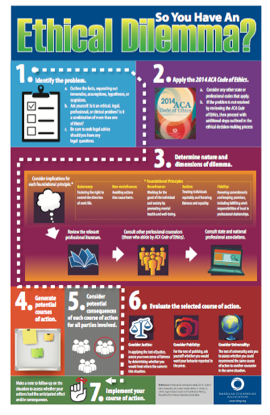Navigating the Ethical Decision-Making Process
A Practical Toolkit for LPCs, Educators, and Students
Today’s counseling professionals practice in an increasingly complex world. Difficult situations can arise in any counseling setting, and when they do, counselors “are expected to engage in a carefully considered ethical decision-making process” per the 2014 ACA Code of Ethics.
In 1996 Holly Forester-Miller, Ph.D. and Thomas E. Davis, Ph.D. collaborated with the American Counseling Association to develop such a process, ultimately publishing a white paper titled, “Practitioner’s Guide to Ethical Decision Making.” This frequently cited professional resource has served as a guide for countless counseling professionals over the years.
We are happy to announce that Forester-Miller and Davis have once again partnered with ACA to update the white paper. The 2016 version of “Practitioner’s Guide to Ethical Decision Making” is now available as a downloadable/printable PDF.
Access the white paper PDF here (926 KB).
Questions or comments? Please contact ACA's Center for Knowledge and Learning here.
Pro Bono Services
As a professional counselor, you have an obligation to provide pro bono services. The ACA Code of Ethics Standard C.6.e. states, “Counselors make a reasonable effort to provide services to the public for which there is little or no financial return (e.g., speaking to groups, sharing professional information, offering reduced fees).” Professional counselors who manage a health care business should also operate as ethical businesspeople. Always consider ethical, legal, and compliance issues before reducing fees or copays or underbilling.
Opportunities
Be attentive to justice and advocacy efforts designed to support the general public. For instance, you could offer counseling services, consultation, public service presentations, and other services for free or for significantly reduced fees. It is ethically essential to prioritize your work that's pro bono.
Here are some things to consider when offering pro bono work:
- Remain cognizant of the potential for exploitation of clients, attend to their vulnerabilities, and consider their best interests in all professional decisions.
- Look for opportunities to serve your local community by providing some pro bono services that capitalize on your unique interests and skills (e.g., speaking, teaching, mentoring, leading support groups, volunteering at a local nonprofit clinic).
- Remember pro bono services are subject to the same rigorous ethical standards as all other counseling services. Practitioners offering clinical mental health services must also remain compliant with state and federal laws.
Cautions
If you contract with third-party reimbursement organizations (such as health insurance companies, employee assistance programs, or Medicaid), you should use one fee schedule and charge the same rate for each service rendered. Why? Because, as a counselor, you adhere to ethical standards and laws (see ACA Standards C.1. and I.1.b.) and you do not discriminate (see ACA Standard C.5.).
Using different fee schedules or rates could also put you or your practice at risk for the following reasons:
- Charging different rates for services reimbursed by federally funded programs opens you to risks of fraud accusations or investigations by the Centers for Medicare & Medicaid Services (CMS). In general, Medicaid and other third-party insurance plans prohibit practitioners from waiving copays.
- Insurance companies may be unwilling to honor a fee schedule if a practitioner charges different fees for the same contracted service.
- Offering remuneration to clients is unethical and potentially illegal (ACA Standard A.1.b.). While there are exceptions, waiving copays/fees and underbilling are potential HIPAA violations.
- Offering different fees to different clients could make your health care business vulnerable to accusations of discrimination or lawsuits.
The decision to engage in pro bono work is voluntary and determined solely by each individual counselor. ACA is not responsible for any decisions or outcomes relating to the provision of pro bono or other services, including those relating to insurance benefits or coverage. When providing pro bono services, counselors must comply with the ACA Code of Ethics and other ethical and legal standards and professional responsibilities in the same manner as they would when providing paid or other services.
The following infographic provides a quick reference guide to the material presented in “Practitioner’s Guide to Ethical Decision Making” by Holly Forester-Miller, Ph.D. and Thomas E. Davis, Ph.D.

Additional Code of Ethics Resources
Click here to learn more about our comprehensive six-part webinar covering various components of the 2014 Code; relevant Counseling Today articles; a FREE podcast; books (ACA Ethical Standards Casebook and more); and Ethics Consults.
Back To Top